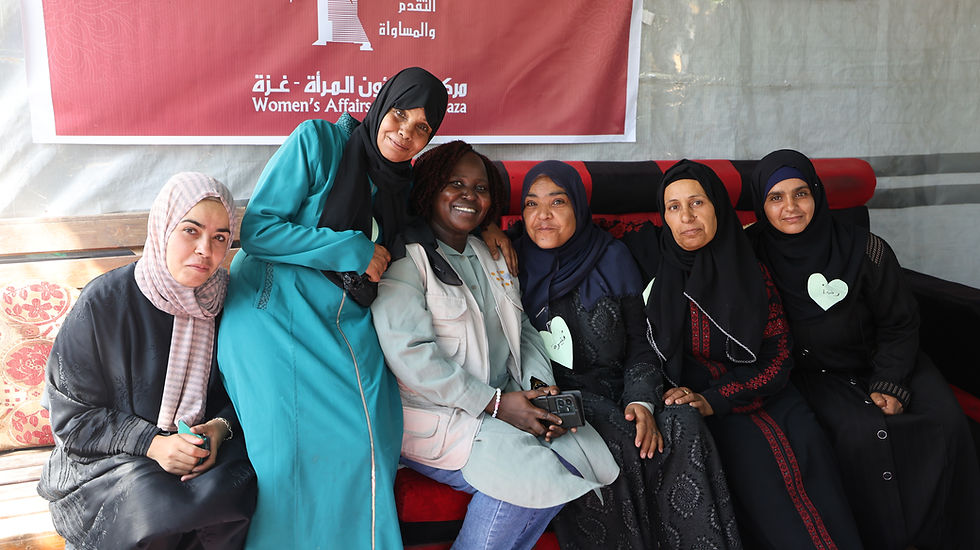Ukraine emergency - the largest response operation supported by WHO’s Standby Partners in 2022
- Standby Partnership Network

- May 15, 2023
- 4 min read
It has been one year since WHO scaled up operations following the Russian Federation’s invasion of Ukraine. This has been the largest response operation supported by WHO’s Standby Partners in 2022.
WHO recognizes the strong contribution from its Standby Partners with a total of 22 expert personnel deployed to offices in Ukraine, Poland, the Regional Office for Europe (EURO), Romania, Bulgaria, and Hungary. These experts covered various technical areas such as Sub-National Health Cluster Coordination, Prevention of Sexual Exploitation and Abuse and Harassment (PRSEAH), Geographic Information Systems (GIS) and Information Management, Risk Communication and Community Engagement (RCCE), Mental Health and Psychosocial Support (MHPSS), Gender Based Violence (GBV), Sexual and Reproductive Health (SRH), Logistics, Monitoring, and Evaluation.
Standby Partners that provided this expertise were NORCAP (PRSEAH, Health Cluster Coordination, Logistics, Monitoring and Evaluation), CANADEM (Health Cluster Coordination, MHPSS, PRSEAH, Information Management, SRH, GIS), RedR Australia (GBV Specialist), IMMAP (Information Management Officers supporting the health cluster in Ukraine), Dutch Surge Support (MHPSS experts deployed to Hungary and Bulgaria), and UK-MED (RCCE Specialists).
“The technical expertise and commitment of the stand-by-partners deployed to WHO Poland to support the response to the Ukrainian emergency have been outstanding. These excellent professionals have provided expertise in multiple areas of the response, such as information management, mental health and psychological support, gender-based violence, and PRSEAH. WHO and Standby Partners have jointly benefited from fruitful and rich cooperation and exchange of knowledge.”
Paloma Cuchi, WHO Representative Poland
A third of all SBP deployments were supported by NORCAP, with seven experts deployed, out of which three were PRSEAH experts supporting Ukraine, Poland, and the neighboring countries in a roving capacity, which has been a critical area for the overall response.
"From the onset, all personnel were onboarded to ensure PRSEAH was mainstreamed in the Ukraine response. I was most inspired by the in-country missions to Slovakia, Poland, Romania, Moldova and working together with different humanitarian partners to ensure our accountability to PRSEAH and commitment in supporting survivors."
Irene Quizon, NORCAP

"Thanks to the strong partnership and collaboration with our Standby Partners (NORCAP, CANADEM, and ZIF) and to UK FCDO for the funding support, WHO was able to deploy highly qualified and committed PRSEAH experts to multiple priority emergency operations, including the Ukraine emergency, Ebola SVD outbreak in Uganda, Ethiopia, Somalia, and the Sahel crisis. This was instrumental for defining the PRSEAH model for WHO Health Emergency Operations and helping accomplish some of the critical milestones. We look forward to a truly strengthened partnership and collaboration for future events."
Margaret Lamunu, PRSEAH Lead, WHO Health Emergencies Programme
CANADEM also deployed seven experts to WHO Ukraine and Poland across various functional areas: Health Cluster Coordination, Mental Health, Psychosocial Support, Prevention of Sexual Exploitation and Abuse and Harassment, Information Management, Sexual and Reproductive Health, and GIS.
Olga Khan (CANADEM) was deployed as an MHPSS specialist to WHO Poland to lead WHO’s MHPSS activities, including co-chairing the MHPSS Technical Working Group under the Interagency Refugee Coordination Structure in Poland. She was also in charge of organizing capacity-building activities on WHO evidence-based MHPSS interventions. Olga’s work has been crucial to expanding the capacity to provide MHPSS services to refugees in Poland.

UK-MED deployed two Risk Communication and Community Engagement (RCCE) Specialists to support the WHO/Europe response to the emergency in Ukraine from March to June 2022.
RCCE is a critical response function that provides public health advice to affected populations and engages communities in the response. RCCE specialists were needed in Ukraine’s surrounding countries to coordinate RCCE strategies and plans, implementing and measuring RCCE activities in the context of refugees arriving from Ukraine.
These deployments were vital for the response operations in Ukraine as well as neighboring countries (Poland, Czech Republic, Romania) to better understand the needs and perceptions of Ukraine refugees and how to best support them. These missions had a significant impact as they facilitated in-depth qualitative data collection and analysis on the perceptions, needs, concerns, and fears of the Ukrainian refugees regarding health aspects.
Diana Maddah, deployed as RCCE Specialist from UK-MED, jointly with WHO Regional Office for Europe (EURO) contributed to the paper “Risk Communication and Community Engagement in Action During Ukraine’s War,” published in the Annals of Global Health Journal. The paper showcases the RCCE measures applied to the Ukrainian emergency to ensure that Ukrainian refugees access health services in host countries based on their needs and concerns.

“Lessons learned from the response in Ukraine’s surrounding countries highlight that community engagement is at the core of greater acceptance and uptake of protective health measures and of social cohesion. This is largely based on trust building between authorities and communities.”
Diana Maddah, Senior Health Advisor – Risk Communication and Community Engagement& Research, UK-MED.

Melanie Hyde, deployed by RedR Australia as a Gender Based Violence Specialist to WHO Poland, reflected on her six-month assignment supporting the Ukraine emergency response:
"My experience as a gender-based violence specialist with WHO Poland has been overwhelmingly positive. I am grateful to have worked with global experts to introduce the clinical guidelines and tools developed by WHO on GBV to the Polish context, which will have a lasting impact on access to health for survivors for many years to come."
WHO appreciates the support received from its Standby Partners and their contributing donors for the effective and quick deployment of surge personnel to respond to this emergency.
You can find this story also on WHO’s website.
If you are interested to read more about the role of Standby Partnership Deployments in the 2022 Ukraine response, we invite you to take a look at the SBP Network's Joint Monitoring Mission Report.




Comments